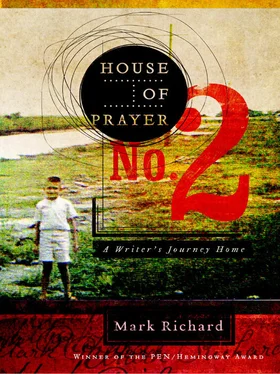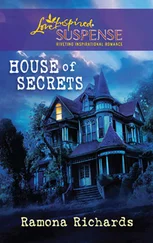In the mail are test results. One test result says the mother is most likely pregnant again. The other test result says the special child is eligible for a special school if the father can afford it.
The father goes down to check on his underwater property. While he and his family have been away in Louisiana, the idiots at the dam finally adjusted the water levels on the lake just right. The shoreline is exactly where he and the German had predicted it would be. In the lowering fluctuations of the lake all the German’s beautiful sand has washed along the father’s shoreline and blanketed his property with long, broad beaches. Where the German’s beautiful beaches had been are ugly slick stretches of slippery red clay corrupted through and through by the black roots of drowned trees. Zat iss in der past, you must let it go , the father tells the angry German. The German and his family move away.
In the fall the special child starts second grade. His second-grade teacher is Miss Caroon. Miss Caroon has seen his test results, so she lets him spend as much time as he wants reading The Boxcar Children and Mark Twain in the cloakroom while the other children struggle with Dick and Jane and Baby Sally and Spot. Miss Caroon lets him wear his father’s Army helmet in the classroom if he wants to, and she lets him try to pass off the wad of Confederate money he always carries. At Thanksgiving, when he draws the Pilgrims coming to the New World in a Chinese junk greeted by Indians selling Live Bait and Cold Beer, she hangs his picture on the wall with all the rest without extraordinary comment.
Miss Caroon gives the children in her class a list of words from which to make a story. In the stories the class turns in, dogs get up on the furniture when they aren’t supposed to or someone finds a coin. From the special child she receives “The Ancient Castle,” in which a Good King goes away to conquer an enemy and while he is gone an Evil King comes and lays siege to the Good King’s castle. The Evil King’s men scale the walls, and some of the Good King’s favorite men are shot full of arrows and beheaded. Just when all seems to be lost, everyone looks up and sees a brilliant flash of light on a distant hill. It is the sun shining off the Good King’s shield. The Good King and his men come and slaughter the Evil King and all the Evil King’s men. The people in the Good King’s castle are so happy, they have a huge banquet and feast on roast duck and turkey. After they have eaten all they can eat, they begin singing the Good King’s favorite songs. Miss Caroon reads the child’s story out loud to the class. She especially likes the last sentence in the story and takes her time sounding it out— And the singing went on for days .
Miss Caroon hands back the stories, and the child receives an A-minus because he misspells “Ancient” in the title. This is a very good story, she tells the child. When his mother comes to visit on Parents’ Day, Miss Caroon tells her that her son is a special child, that he could be a writer someday if he wanted to be one. The mother shakes her head sadly and tells Miss Caroon the truth. She has to tell Miss Caroon that all the child wants to be when he grows up is the man who walks around the monkey house all day with a nail on the end of a stick.

SAY YOU ARE THE SPECIAL CHILD. Say one reason you are special is because there is something wrong with your legs. You cannot run. Your legs will not move fast enough. When you try to run, your hips click and pop. When you have to run a race, like at the going-away party at a doctor’s house in the old town, when everyone was running toward the doctor’s house that would burn completely to the ground the next year, you pretend to trip and fall and not finish the race. You avoid footraces; you avoid running at all. When something bad happens and everyone else runs away, rocks thrown through greenhouse glass, loose spikes thrown at passing caboose windows, fishing boats untethered along a riverbank, you know you will have to face whoever is coming at you in their anger. You learn you must never get caught.
In the new town the teachers don’t say you are special as the teachers did in the old town. They use the word “slow.” And you are slow. But they also say you are slow when you are sitting at your desk unable to color the state bird. You can’t get the red crayon to work on the cardinal in a way that makes the teacher happy. Your father has said to be careful about signing your name to anything, so you don’t put your name on your homework. A suspicious teacher has said that if your parents are really from Louisiana, you must be able to speak French. Oui , you say. You try to speak with a French accent, you still try to spend your Confederate money, you still wear your father’s Army helmet to school. No one can understand what you are saying, and big boys from out in the county want to fight you in line to the cafeteria. They come up behind you and flip off your helmet and you have to fight them almost every day. The fighting finally stops when you break a boy’s hand. When your mother finds out, she cries because she is afraid the boy is the son of a new friend of hers. You get the feeling it was selfish of you to break the boy’s hand.
A good afternoon in the new town is when the school is struck twice by lightning. Everyone else starts crying when the lightning strikes the swing set first. You stand at the window. It’s raining and thundering and the lightning strikes the roof, but the sun is also shining, and you heard from your father’s mother that when it rains and the sun is shining, it means the Devil is beating his wife. As the big boys from the county and all the little girls cry for their mommies and the teacher is shouting for everyone to get into the cloakroom, you clap and laugh and shout, The Devil is beating his wife! The Devil is beating his wife! The children and teacher are afraid of your loud laughter, you can tell by their looks as they crowd into the cloakroom as you stand by the open window getting soaked by the windblown rain, the special child.
One morning you do not have to go to school. Your father does not put on his forest clothes—khaki shirt, denim jeans, snake pistol, long-sheath knife, the boots with wire laces that won’t burn in case he gets caught in a forest fire and has to make a run for it. He puts on a coat and a tie, and you get in the car with him. He drives you to Richmond, through swamps, low woodlands, fields turned over for peanuts and corn. Neither of you speaks, there’s just the tires on the corduroy road and his flying-tiger class ring clicking the window when he lifts his cigarette ash to the rolled-down crack at the top. You always keep an eye out for the tiger, you never know when it may fly across your face.
Your father turns the grey sedan in to a long driveway between green lawns to a place that looks like a museum. Your father signs you in, and you take an elevator upstairs. The place smells like linoleum wax and medicine and shitty diapers.
You and your father sit on folding chairs in a long dark hallway with other fathers and mothers and what an odd boy who lives in the place later calls sin spawn : children with withered legs, legs of different lengths, bent-up legs, legs in steel and leather braces, hobbling kids crying and carrying the smell of places where people live who tote water in buckets from a well and go to the bathroom in sheds out back. A lot of the people waiting have long greasy hair that needs cutting. You can tell some are missing teeth when they talk and smoke and spit in the metal trash can by the exam room door.
A woman in a white uniform comes out with a clipboard and hands it to your father. You can read the top of the paper, and you understand why you are special when you read crippled CHILDREN’S HOSPITAL.
Читать дальше













